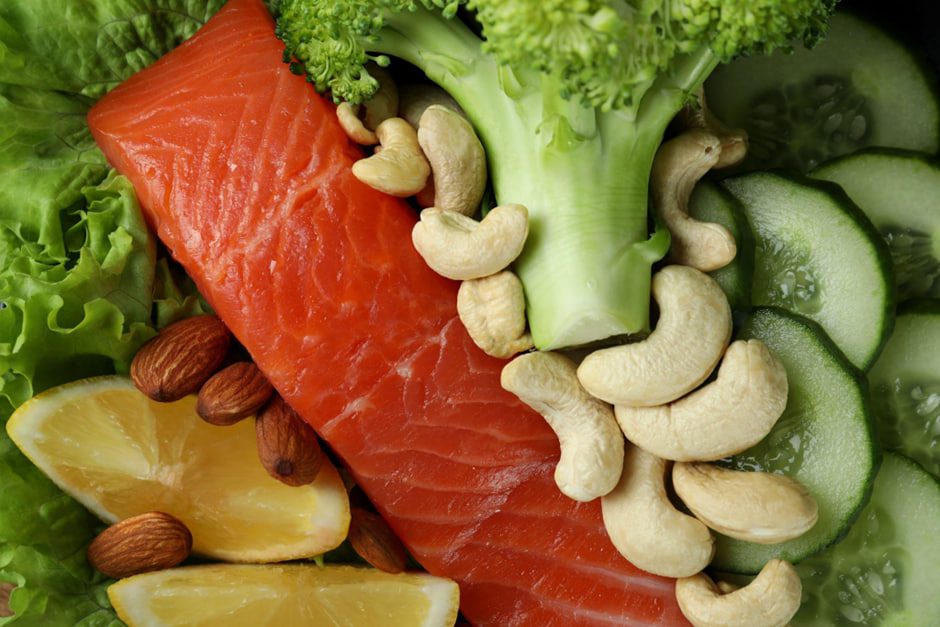We often see people with beautiful skin and wonder how they do it. It may be what they eat! After all, our skin is our largest organ. What we put into our bodies can impact its health and appearance. Beauty may only be skin deep, but true wellbeing goes far beyond surface appearances. Of course, our skin can be affected by external factors. Yet, nurturing it from the inside out can give you a radiant and glowing complexion. In this article, we will explore the powerful connection between our diet and skin health. The tips below can help everyone! Get ready to discover a skin-friendly diet that will have you looking and feeling your best!
What to eat for skin health

Adding the right nutrients to our diet can do wonders for our skin’s health. So, what should you eat to nourish your skin from within? Let’s explore some skin-friendly foods and their benefits.
- Including a wide variety of fruits and vegetables in your diet is essential for vibrant skin. They’re rich in vitamins, minerals, and antioxidants. Vitamins A, C, and E are particularly good for skin health. They help promote collagen production, protect against sun damage, and fight inflammation. And their high-water content keeps your skin supple and glowing.1
- Fermented dairy products. These include yogurt or kefir, which provide your skin with a dose of beneficial probiotics. Probiotics help maintain a healthy gut microbiome, which influences skin health. You can also try plant-based alternatives like coconut yogurt or almond kefir. They can still offer probiotic goodness!2
- Oily fish, such as salmon, mackerel, and sardines, are great sources of omega-3 fatty acids. These healthy fats help moisturize our skin and reduce inflammation. Flaxseeds, chia seeds, and walnuts are good alternatives for those on a plant-based diet. They also provide plenty of omega-3 fatty acids.3
- Adding a drizzle of extra virgin olive oil to your meals can also benefit your skin. This heart-healthy oil contains antioxidants called polyphenols and healthy fats. They can combat inflammation and provide moisture and elasticity to your skin.4
- Nuts and seeds are rich in essential nutrients. They are especially high in vitamin E, zinc, and selenium, which are vital for skin health. Vitamin E is a potent antioxidant that protects skin from damage caused by free radicals. A handful of almonds, walnuts, sunflower seeds, or chia seeds can give your skin a boost.1
- Certain herbs and spices offer great skin benefits. Turmeric contains curcumin, a potent anti-inflammatory compound. It can help calm skin conditions like acne or eczema. Cinnamon has antioxidant properties that may promote collagen production and maintain skin elasticity. Adding these herbs to your diet can provide both flavor and skin benefits!1,5
- Protein is essential for skin health. It is one of the building blocks for collagen production. Collagen peptides are easily absorbed forms of collagen. They can support skin elasticity and reduce the look of wrinkles. Lean meats, legumes, and tofu are great sources of protein. They can support your skin’s structural integrity.6
What to avoid for skin health

Besides adding skin-friendly foods to your diet, it can also help to avoid certain foods. By avoiding these substances, you can support your skin’s health and appearance.
- Advanced glycation end products (AGEs). AGEs are formed when sugars react with proteins and fats in our bodies. They can speed up the aging process and cause skin damage and wrinkles. Try reducing your intake of high-sugar foods and beverages and processed and fried foods. Eating whole, unprocessed foods combined with cooking methods like steaming, baking will help to reduce the formation of AGEs.7
- High Glycemic Index (GI) substances. Foods rich in refined carbohydrates can cause spikes in blood sugar levels. That can lead to inflammation and potential skin issues. It’s best to limit your consumption of sugary drinks, sweets, white bread, and other refined grains. Instead, choose low-GI alternatives like whole grains, legumes, and fruits.8
- Certain lifestyle habits can have a negative impact on your skin’s health. Smoking damages collagen and elastin fibers. This can lead to premature aging, wrinkles, and a dull complexion. Excessive alcohol consumption can dehydrate your skin and contribute to inflammation. Also, prolonged sun exposure without proper protection can lead to sun damage, skin aging, and an increased risk of skin cancer.9-11

Take-home message
A diet rich in fruits, vegetables, fermented foods, healthy fats, and essential nutrients is great for your skin! It can give your skin the nourishment it needs. Avoiding AGEs, high-GI substances, smoking, overdrinking, and excessive sun exposure will also contribute to maintaining the health and vitality of your skin. When you make choices to focus on your wellbeing, you can achieve a vibrant and healthy complexion that shines from within. Embrace the power of a skin-friendly diet!
Sign up for our newsletter
Follow our story
The skin-healthy diet
We often see people with beautiful skin and wonder how they do it. It may be what they eat! Stay tuned.

October 5th, 2023
We often see people with beautiful skin and wonder how they do it. It may be what they eat! After all, our skin is our largest organ. What we put into our bodies can impact its health and appearance. Beauty may only be skin deep, but true wellbeing goes far beyond surface appearances. Of course, our skin can be affected by external factors. Yet, nurturing it from the inside out can give you a radiant and glowing complexion. In this article, we will explore the powerful connection between our diet and skin health. The tips below can help everyone! Get ready to discover a skin-friendly diet that will have you looking and feeling your best!
What to eat for skin health

Adding the right nutrients to our diet can do wonders for our skin’s health. So, what should you eat to nourish your skin from within? Let’s explore some skin-friendly foods and their benefits.
- Including a wide variety of fruits and vegetables in your diet is essential for vibrant skin. They’re rich in vitamins, minerals, and antioxidants. Vitamins A, C, and E are particularly good for skin health. They help promote collagen production, protect against sun damage, and fight inflammation. And their high-water content keeps your skin supple and glowing.1
- Fermented dairy products. These include yogurt or kefir, which provide your skin with a dose of beneficial probiotics. Probiotics help maintain a healthy gut microbiome, which influences skin health. You can also try plant-based alternatives like coconut yogurt or almond kefir. They can still offer probiotic goodness!2
- Oily fish, such as salmon, mackerel, and sardines, are great sources of omega-3 fatty acids. These healthy fats help moisturize our skin and reduce inflammation. Flaxseeds, chia seeds, and walnuts are good alternatives for those on a plant-based diet. They also provide plenty of omega-3 fatty acids.3
- Adding a drizzle of extra virgin olive oil to your meals can also benefit your skin. This heart-healthy oil contains antioxidants called polyphenols and healthy fats. They can combat inflammation and provide moisture and elasticity to your skin.4
- Nuts and seeds are rich in essential nutrients. They are especially high in vitamin E, zinc, and selenium, which are vital for skin health. Vitamin E is a potent antioxidant that protects skin from damage caused by free radicals. A handful of almonds, walnuts, sunflower seeds, or chia seeds can give your skin a boost.1
- Certain herbs and spices offer great skin benefits. Turmeric contains curcumin, a potent anti-inflammatory compound. It can help calm skin conditions like acne or eczema. Cinnamon has antioxidant properties that may promote collagen production and maintain skin elasticity. Adding these herbs to your diet can provide both flavor and skin benefits!1,5
- Protein is essential for skin health. It is one of the building blocks for collagen production. Collagen peptides are easily absorbed forms of collagen. They can support skin elasticity and reduce the look of wrinkles. Lean meats, legumes, and tofu are great sources of protein. They can support your skin’s structural integrity.6
What to avoid for skin health

Besides adding skin-friendly foods to your diet, it can also help to avoid certain foods. By avoiding these substances, you can support your skin’s health and appearance.
- Advanced glycation end products (AGEs). AGEs are formed when sugars react with proteins and fats in our bodies. They can speed up the aging process and cause skin damage and wrinkles. Try reducing your intake of high-sugar foods and beverages and processed and fried foods. Eating whole, unprocessed foods combined with cooking methods like steaming, baking will help to reduce the formation of AGEs.7
- High Glycemic Index (GI) substances. Foods rich in refined carbohydrates can cause spikes in blood sugar levels. That can lead to inflammation and potential skin issues. It’s best to limit your consumption of sugary drinks, sweets, white bread, and other refined grains. Instead, choose low-GI alternatives like whole grains, legumes, and fruits.8
- Certain lifestyle habits can have a negative impact on your skin’s health. Smoking damages collagen and elastin fibers. This can lead to premature aging, wrinkles, and a dull complexion. Excessive alcohol consumption can dehydrate your skin and contribute to inflammation. Also, prolonged sun exposure without proper protection can lead to sun damage, skin aging, and an increased risk of skin cancer.9-11

Take-home message
A diet rich in fruits, vegetables, fermented foods, healthy fats, and essential nutrients is great for your skin! It can give your skin the nourishment it needs. Avoiding AGEs, high-GI substances, smoking, overdrinking, and excessive sun exposure will also contribute to maintaining the health and vitality of your skin. When you make choices to focus on your wellbeing, you can achieve a vibrant and healthy complexion that shines from within. Embrace the power of a skin-friendly diet!
We often see people with beautiful skin and wonder how they do it. It may be what they eat! After all, our skin is our largest organ. What we put into our bodies can impact its health and appearance. Beauty may only be skin deep, but true wellbeing goes far beyond surface appearances. Of course, our skin can be affected by external factors. Yet, nurturing it from the inside out can give you a radiant and glowing complexion. In this article, we will explore the powerful connection between our diet and skin health. The tips below can help everyone! Get ready to discover a skin-friendly diet that will have you looking and feeling your best!
What to eat for skin health

Adding the right nutrients to our diet can do wonders for our skin’s health. So, what should you eat to nourish your skin from within? Let’s explore some skin-friendly foods and their benefits.
- Including a wide variety of fruits and vegetables in your diet is essential for vibrant skin. They’re rich in vitamins, minerals, and antioxidants. Vitamins A, C, and E are particularly good for skin health. They help promote collagen production, protect against sun damage, and fight inflammation. And their high-water content keeps your skin supple and glowing.1
- Fermented dairy products. These include yogurt or kefir, which provide your skin with a dose of beneficial probiotics. Probiotics help maintain a healthy gut microbiome, which influences skin health. You can also try plant-based alternatives like coconut yogurt or almond kefir. They can still offer probiotic goodness!2
- Oily fish, such as salmon, mackerel, and sardines, are great sources of omega-3 fatty acids. These healthy fats help moisturize our skin and reduce inflammation. Flaxseeds, chia seeds, and walnuts are good alternatives for those on a plant-based diet. They also provide plenty of omega-3 fatty acids.3
- Adding a drizzle of extra virgin olive oil to your meals can also benefit your skin. This heart-healthy oil contains antioxidants called polyphenols and healthy fats. They can combat inflammation and provide moisture and elasticity to your skin.4
- Nuts and seeds are rich in essential nutrients. They are especially high in vitamin E, zinc, and selenium, which are vital for skin health. Vitamin E is a potent antioxidant that protects skin from damage caused by free radicals. A handful of almonds, walnuts, sunflower seeds, or chia seeds can give your skin a boost.1
- Certain herbs and spices offer great skin benefits. Turmeric contains curcumin, a potent anti-inflammatory compound. It can help calm skin conditions like acne or eczema. Cinnamon has antioxidant properties that may promote collagen production and maintain skin elasticity. Adding these herbs to your diet can provide both flavor and skin benefits!1,5
- Protein is essential for skin health. It is one of the building blocks for collagen production. Collagen peptides are easily absorbed forms of collagen. They can support skin elasticity and reduce the look of wrinkles. Lean meats, legumes, and tofu are great sources of protein. They can support your skin’s structural integrity.6
What to avoid for skin health

Besides adding skin-friendly foods to your diet, it can also help to avoid certain foods. By avoiding these substances, you can support your skin’s health and appearance.
- Advanced glycation end products (AGEs). AGEs are formed when sugars react with proteins and fats in our bodies. They can speed up the aging process and cause skin damage and wrinkles. Try reducing your intake of high-sugar foods and beverages and processed and fried foods. Eating whole, unprocessed foods combined with cooking methods like steaming, baking will help to reduce the formation of AGEs.7
- High Glycemic Index (GI) substances. Foods rich in refined carbohydrates can cause spikes in blood sugar levels. That can lead to inflammation and potential skin issues. It’s best to limit your consumption of sugary drinks, sweets, white bread, and other refined grains. Instead, choose low-GI alternatives like whole grains, legumes, and fruits.8
- Certain lifestyle habits can have a negative impact on your skin’s health. Smoking damages collagen and elastin fibers. This can lead to premature aging, wrinkles, and a dull complexion. Excessive alcohol consumption can dehydrate your skin and contribute to inflammation. Also, prolonged sun exposure without proper protection can lead to sun damage, skin aging, and an increased risk of skin cancer.9-11

Take-home message
A diet rich in fruits, vegetables, fermented foods, healthy fats, and essential nutrients is great for your skin! It can give your skin the nourishment it needs. Avoiding AGEs, high-GI substances, smoking, overdrinking, and excessive sun exposure will also contribute to maintaining the health and vitality of your skin. When you make choices to focus on your wellbeing, you can achieve a vibrant and healthy complexion that shines from within. Embrace the power of a skin-friendly diet!
Sign up for our newsletter
Follow our story